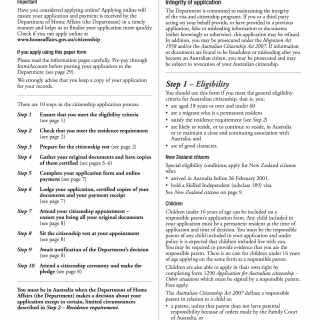Form 1300t. Application for Australian citizenship - General eligibility
The Form 1300t is an application form for individuals seeking Australian citizenship and meeting the general eligibility criteria. The main purpose of the form is to gather personal information and assess the applicant's eligibility based on certain requirements.
The form consists of several parts that require the applicant to provide their personal details, address history, employment history, educational qualifications, and immigration details. It also includes questions related to the applicant's character, criminal record, and language proficiency.
Important fields in the form include the applicant's full name, date of birth, current address, contact information, residency status, and reasons for seeking Australian citizenship. The form also requires applicants to attach supporting documents such as proof of identity, residency, and character references.
The parties involved in the form are the applicant and the Department of Home Affairs, which is responsible for processing the application.
When filling out the form, it is important to consider providing accurate information and ensuring all required fields are completed. Failure to provide complete and accurate information may lead to delays or rejection of the application.
Examples of application cases include individuals who have lived in Australia as permanent residents for at least four years and meet the other eligibility criteria, such as passing a citizenship test and proving English proficiency.
Strengths of the form include its comprehensive nature, which allows the Department of Home Affairs to thoroughly assess an applicant's eligibility for citizenship. Weaknesses may include the lengthy processing times and the potential for errors or omissions when completing the form.
Opportunities for improvement may include making the form available online or simplifying the application process. Threats may include fraudulent applications or security breaches that compromise personal information.
Alternative forms or analogues could include visa applications or immigration forms used by other countries. The key difference is that the Form 1300t specifically applies to individuals seeking Australian citizenship.
The form has significant implications for the future of the applicant as it determines their ability to become citizens of Australia, including access to certain rights and privileges such as voting in elections and obtaining an Australian passport.
The Form 1300t is submitted to the Department of Home Affairs either by mail or in person. Once processed, the application is stored electronically in the department's database.

